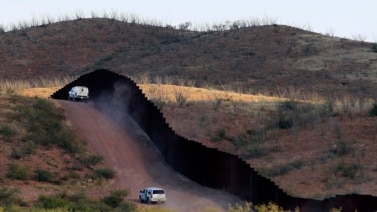The United States recently launched a campaign to expel illegal immigrants from Central America.
The Obama administration targeted people who stayed after they were told to leave the country. Government agents detained 121 Central Americans, many of them women and children.
VOA’s Carolyn Presutti recently spoke with a number of undocumented migrants just after their homes were raided. They came to the U.S. mainly for economic reasons. Their full names are not made public because of the sensitivity of the issue.
Maria, age 8, said she was cleaning her teeth and preparing to go to school, when she heard a noise at the door. She opened the door and found eight immigration agents.
“I said, ‘Who are you?’ and they didn’t tell me their names. They said, 'Is there a grown-up here?' And I said, 'Yes,' ” she continued.
Maria said she was “trying to be brave,” knowing “they would never get my family because my family hasn’t done anything bad.”
But Maria’s Aunt Sofia is in the United States illegally. So are other adults who were not at home when the agents arrived.
Sofia hid in a ground floor bedroom with her three baby boys during the raid. Agents went room to room, but never looked in the basement.
“I thought they were going to enter the room with my children there and take me,” Sofia said.
While she was able to avoid getting detained by the immigration agents, Sofia said she is still full of fear.
“Now, I don’t know what I can do. I’m not even going to the grocery store anymore. I’m scared to go,” she said.
The Obama administration said the raids are designed to send a message to people in Central America. It wants to prevent more mass migration to the United States.
The administration wants to avoid a repeat of the 2014 immigration crisis. Two years ago, tens of thousands of Central Americans were traveling across the Mexican border. Many were children.
Jeh Johnson heads the federal agency that organized the raids.
“Our borders are not open to illegal migration,” said Johnson, Secretary of the Department of Homeland Security. “If you come here illegally, we will send you back consistent with our laws and values.”
Immigrant advocates call the raids inhumane.
Cecillia Wang is director of the American Civil Liberty Union’s Immigrants' Rights Project. She says “The administration is doubling down on a system that is rigged against these families. Many of these mothers and children had no lawyers because they could not afford them.
"Without counsel, traumatized refugees don't understand what is happening in court and cannot get their legitimate asylum claims heard."
But two candidates for the Republican presidential nomination, Donald Trump and Ted Cruz, want to do much more. Both said they would try to expel all estimated 11 million illegal immigrants in the United States.
Trump also promises to build a fence along the Mexican border and get Mexico to pay for it.
“You're going to have a deportation force, and you're going to do it humanely," he said on MSNBC. “Don't forget that you have millions of people that are waiting in line to come into this country, and they're waiting to come in legally. And I always say the wall, we're going to build the wall. It's going to be a real deal. It's going to be a real wall."
Immigration activists have reacted to the recent raids by holding meetings and handing out “Know Your Rights” cards.
The cards have the following message in both English and Spanish:
“I do not give you permission to enter my home based on my 4<sup>th</sup>amendment rights under the U.S. Constitution, unless you have a warrant.”
Maria tells VOA she does not plan to get to that point. “I’ve learned to never open the door and to look out the window,” she says.
I’m Mary Gotschall.
Carolyn Presutti reported on this story for VOANews.com. Bruce Alpert adapted this story for Learning English. George Grow was the editor.
We want to hear from you. Write to us in the Comments Section or share your views on our Facebook page.
Words in this Story
migrant – n. a person who goes from one place to another especially to find work
basement – n. the part of a building or house that is entirely or partly below ground
doubling down – v. moving ahead with a program or policy with energy
rig – v. to control or affect something in a corrupt way
afford – v. to be able to pay for something
counsel – n. a lawyer who represents a person or group in a legal matter
traumatize – v. to cause (someone) to become very upset in a way that often leads to serious emotional problems
deportation – n. to force a person to leave the country
warrant – n. a document issued by a court that gives the police the power to do something


